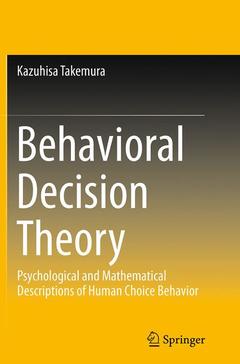Description
Behavioral Decision Theory, Softcover reprint of the original 1st ed. 2014
Psychological and Mathematical Descriptions of Human Choice Behavior
Author: Takemura Kazuhisa
Language: English
Subjects for Behavioral Decision Theory:
Approximative price 105.49 €
In Print (Delivery period: 15 days).
Add to cartSupport: Print on demand
Description
/li>Contents
/li>Comment
/li>
This book provides an overview of behavioral decision theory and related research findings. In brief, behavioral decision theory is a general term for descriptive theories to explain the psychological knowledge related to decision-making behavior. It is called a theory, but actually it is a combination of various psychological theories, for which no axiomatic systems, such as the utility theory widely used in economics, have been established; it is often limited to qualitative knowledge. However, as suggested in the studies of H. A. Simon, who won the Nobel Prize for Economics in 1978, and D. Kahneman, who won the prize in 2002, the psychological methodology and knowledge of behavioral decision theory have been applied widely in such fields as economics, business administration, and engineering, and are expected to become more useful in the future. This book explains various behavioral decision theories related to decision-making processes. Numerous models have been proposed to explain the psychological processes related to such a selection of decision strategies, and this book also introduces some new models that are useful to explain decision-making processes. The book concludes with speculation about the future of modern behavioral decision theories while referring to their relation to fields associated with neuroscience, such as neuroeconomics, that have been developed in recent years. In addition, each chapter includes a bibliography that can be referred to when studying more details related to behavioral decision theory. Reading this book requires no advanced expertise; nonetheless, an introductory knowledge of psychology, business administration, and economics, and approximately a high school graduate?s level of mathematics should facilitate the reader?s comprehension of the content.
Presents the conceptual and mathematical framework of decision-making processes and explains how decision making can be better understood and explained
Provides a re-interpretation of existing theories and proposes a new overview of decision behaviors by integrating mathematical and psychological perspectives
Introduces a new behavioral decision theory that differs substantially from the theoretical system proposed by Daniel Kahneman and Amos Tversky
Includes supplementary material: sn.pub/extras




